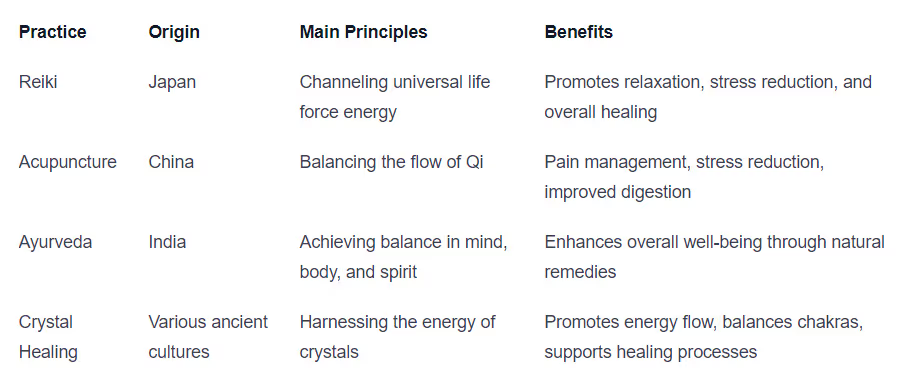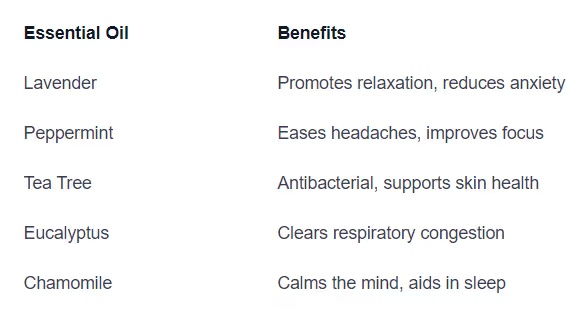14 Types of Holistic Health Practices

Introduction to Holistic Health
Holistic health is an approach to wellness that considers the whole person – mind, body, and spirit – as interconnected and interdependent. It emphasizes the importance of achieving balance and harmony in all aspects of life to promote overall well-being. By addressing the physical, mental, emotional, and spiritual aspects of health, holistic practices aim to support the body's natural healing abilities and enhance overall quality of life.
What is Holistic Health?
Holistic health is a comprehensive approach to wellness that goes beyond treating symptoms or isolated health issues. It recognizes that all aspects of a person's life, including their lifestyle, environment, emotions, and beliefs, can influence their overall health. Rather than focusing solely on the physical body, holistic health takes into consideration the interconnectedness of the mind, body, and spirit.
The underlying principle of holistic health is that when one aspect of a person's well-being is out of balance, it can affect other areas as well. By taking a holistic approach, individuals can address the root causes of health issues and work towards achieving optimal wellness.
Benefits of Holistic Health Practices
Engaging in holistic health practices can offer numerous benefits for individuals seeking a balanced and fulfilling life. Here are some advantages of incorporating holistic health practices into your routine:
- Comprehensive well-being: Holistic health practices address various aspects of health, including physical, mental, emotional, and spiritual well-being, leading to a more comprehensive state of wellness.
- Stress reduction: Many holistic practices, such as meditation and yoga, are known for their stress-relieving benefits. They help individuals relax, reduce anxiety, and promote a sense of calm.
- Improved physical health: Holistic practices often promote healthier lifestyle choices, such as regular exercise, proper nutrition, and adequate sleep, which can contribute to improved physical health.
- Enhanced mental clarity: Practices like meditation and mindfulness can improve focus, concentration, and mental clarity, allowing individuals to approach their daily tasks with increased effectiveness.
- Emotional balance: Holistic health practices encourage emotional self-care and provide tools for managing emotions, leading to greater emotional balance and resilience.
- Increased self-awareness: Holistic practices promote self-reflection and self-awareness, helping individuals develop a deeper understanding of themselves and their needs.
- Promotion of inner peace: Through practices like meditation and energy healing, individuals can cultivate a sense of inner peace, leading to greater contentment and happiness.
By embracing holistic health practices, individuals can nurture their overall well-being and create a more balanced and fulfilling life. It's important to note that each person's journey to holistic health may be unique, and it may require exploration and experimentation to find the practices that resonate best with their individual needs and goals.
Mind-Body Practices
In the realm of holistic health, mind-body practices play a significant role in promoting overall well-being. These practices focus on the connection between the mind and body, emphasizing the importance of mental and physical harmony. Let's explore four popular mind-body practices: meditation, yoga, tai chi, and qigong.
Meditation
Meditation is a practice that involves training the mind to achieve a state of deep relaxation and heightened awareness. By focusing on the present moment and calming the mind, meditation can help reduce stress, improve concentration, and promote a sense of inner peace.
There are various types of meditation, including mindfulness meditation, transcendental meditation, and loving-kindness meditation. Each type offers unique techniques and approaches to help individuals achieve a meditative state. Regular meditation practice has been associated with numerous benefits, such as reduced anxiety, improved emotional well-being, and enhanced self-awareness.
Yoga
Yoga is a holistic practice that combines physical postures (asanas), breathing exercises (pranayama), and meditation. It originated in ancient India and has gained popularity worldwide as a means of promoting physical strength, flexibility, and mental clarity.
The practice of yoga not only nurtures the body but also cultivates a sense of inner balance and harmony. It can help reduce stress, increase mindfulness, and enhance overall physical fitness. There are various styles of yoga, such as Hatha, Vinyasa, and Ashtanga, each with its own unique focus and intensity.
Tai Chi
Tai Chi is a gentle and graceful mind-body practice that originated in ancient China. It involves a series of slow, flowing movements combined with deep breathing and focused attention. Tai Chi is often referred to as "moving meditation" because of its meditative and calming nature.
The practice of Tai Chi aims to cultivate the flow of vital energy (qi) throughout the body, promoting balance and harmony. It is known for its numerous health benefits, including improved balance, increased flexibility, and reduced stress. Tai Chi is suitable for individuals of all ages and fitness levels.
Qigong
Similar to Tai Chi, Qigong is a holistic practice that combines movement, breath control, and meditation. It is deeply rooted in Chinese philosophy and traditional medicine. Qigong exercises are designed to cultivate and balance the body's vital energy (qi).
Qigong practice typically involves gentle, rhythmic movements, deep breathing, and mental focus. It aims to promote the smooth flow of energy throughout the body, improve overall health, and enhance mental clarity. Regular practice of Qigong is believed to strengthen the immune system, reduce stress, and increase vitality.
By incorporating mind-body practices like meditation, yoga, tai chi, and qigong into your daily routine, you can promote a sense of balance, harmony, and well-being. These practices offer not only physical benefits but also provide an opportunity for self-reflection and inner growth. Explore and embrace the mind-body connection to experience the transformative power of these holistic health practices.
Energy-Based Practices
Holistic health encompasses a wide range of practices that focus on the mind, body, and spirit. In this section, we will explore four energy-based practices that promote balance and well-being: Reiki, acupuncture, Ayurveda, and crystal healing.
Reiki
Reiki is a Japanese healing technique that involves the transfer of energy through the palms of the hands. It is based on the belief that there is a universal life force energy that flows within and around us. During a Reiki session, the practitioner channels this energy to the recipient, promoting relaxation, stress reduction, and overall healing.
Acupuncture
Acupuncture is a traditional Chinese medicine practice that involves the insertion of thin needles into specific points on the body. These points are believed to be pathways for the flow of energy, known as Qi (pronounced "chee"). By stimulating these points, acupuncture aims to restore the balance of Qi and promote healing. Acupuncture is commonly used to address various health conditions, including pain management, stress reduction, and digestive issues.
Ayurveda
Ayurveda is an ancient Indian holistic health system that focuses on achieving balance and harmony in the mind, body, and spirit. It emphasizes the use of natural remedies, including herbs, diet, lifestyle modifications, and body therapies, to promote overall well-being. Ayurveda recognizes that each individual has a unique constitution, and tailors treatments and recommendations accordingly.
Crystal Healing
Crystal healing is a practice that involves the use of crystals and gemstones to enhance physical, mental, and spiritual well-being. Different crystals are believed to have specific properties and energies that can be harnessed for healing purposes. During a crystal healing session, crystals may be placed on or around the body to promote energy flow, balance chakras, and support healing processes.
It's important to note that while these energy-based practices have gained popularity and have been reported to provide numerous benefits, they should not be used as a substitute for medical treatment. It is always advisable to consult with a qualified healthcare professional before incorporating any holistic health practices into your wellness routine.

By exploring energy-based practices like Reiki, acupuncture, Ayurveda, and crystal healing, individuals can tap into alternative approaches to holistic health and well-being. Each practice offers its unique benefits and can be incorporated into a comprehensive wellness routine.
Movement-Based Practices
Incorporating movement-based practices into your holistic health routine can enhance physical fitness, flexibility, and overall well-being. This section explores four popular movement-based practices: Pilates, Dance Therapy, Feldenkrais Method, and Alexander Technique.
Pilates
Pilates is a low-impact exercise system that focuses on strengthening the core muscles, improving flexibility, and enhancing body awareness. It combines controlled movements with mindful breathing techniques to promote physical and mental balance.
This movement-based practice engages various muscle groups, including the abdominals, back, hips, and glutes. By practicing Pilates regularly, individuals can improve posture, increase muscular strength and endurance, and develop a more stable and aligned body.
Dance Therapy
Dance therapy combines the art of dance with psychological and emotional well-being. It utilizes various dance forms and movement exercises to promote self-expression, release emotions, and improve overall mental health.
Engaging in dance therapy can enhance body awareness, boost self-esteem, reduce stress, and improve communication skills. This form of movement-based therapy encourages individuals to connect with their emotions and express themselves through movement, leading to a greater sense of well-being.
Feldenkrais Method
The Feldenkrais Method is a movement-based practice that focuses on increasing self-awareness and improving movement patterns. It aims to retrain the brain and nervous system to move more efficiently and with less effort, thereby reducing pain and tension.
Through gentle movements and focused attention, individuals practicing the Feldenkrais Method can improve flexibility, coordination, and posture. This approach emphasizes the connection between mind and body, allowing individuals to explore new movement possibilities and develop a deeper understanding of their own physical capabilities.
Alexander Technique
The Alexander Technique is a movement-based practice that focuses on improving posture, balance, and coordination. It involves re-educating the body to move with more ease and efficiency, reducing tension and stress on the musculoskeletal system.
By becoming more aware of their movements and habits, individuals practicing the Alexander Technique can develop better body alignment and movement patterns. This can lead to improved posture, reduced muscle tension, and enhanced overall physical performance.
To choose the movement-based practice that suits you best, consider your personal goals, preferences, and physical condition. Each of these practices offers unique benefits and can contribute to a holistic approach to health and well-being. Incorporating movement-based practices into your routine can help you achieve physical fitness, enhance body awareness, and experience a more balanced and harmonious life.
Other Holistic Health Practices
In addition to mind-body practices and energy-based practices, there are several other holistic health practices that can contribute to a balanced life. These practices focus on various aspects of well-being, including aromatherapy, sound therapy, herbal medicine, and naturopathy.
Aromatherapy
Aromatherapy is a holistic practice that utilizes essential oils extracted from plants to promote physical and emotional well-being. These oils can be inhaled, applied topically, or used in diffusers to create a therapeutic environment.
Aromatherapy has been found to have various benefits, including stress reduction, relaxation, improved sleep, and enhanced mood. Different essential oils have distinct properties, and they can be used individually or in combination to target specific concerns.
Here are some commonly used essential oils and their associated benefits:

Sound Therapy
Sound therapy, also known as sound healing or vibrational therapy, utilizes sound frequencies to promote relaxation, reduce stress, and restore balance in the body and mind. This practice often involves the use of instruments such as singing bowls, gongs, and tuning forks.
The vibrations produced by these instruments are believed to resonate with the body's energy centers, promoting a sense of harmony and well-being. Sound therapy can help release tension, improve concentration, and stimulate the body's natural healing processes.
Herbal Medicine
Herbal medicine, also known as herbalism or botanical medicine, involves the use of plants and plant extracts for therapeutic purposes. This practice has a long history and is used in various traditional healing systems worldwide.
Different herbs have different properties and can be used to address a wide range of health concerns. Some commonly used herbs and their associated uses include:

It's important to note that herbal medicine should be used with caution and under the guidance of a qualified practitioner to ensure safety and efficacy.
Naturopathy
Naturopathy is a holistic approach to healthcare that emphasizes the body's innate ability to heal itself. Naturopathic practitioners aim to identify and address the underlying causes of illness and promote overall wellness.
This practice incorporates various natural therapies, including diet and nutrition, herbal medicine, lifestyle modifications, and stress management techniques. Naturopathy focuses on individualized treatment plans and encourages patients to take an active role in their own health.
Naturopathy can be used to support a wide range of health conditions, from chronic diseases to acute illnesses. It promotes a balanced lifestyle and emphasizes the importance of preventive care.
By exploring these other holistic health practices, individuals can expand their wellness toolkit and find approaches that resonate with their unique needs and goals. It's important to remember that these practices should be used in conjunction with professional guidance and that results may vary from person to person.
Conclusion
In conclusion, holistic health practices offer a wide range of benefits for individuals seeking to enhance their overall well-being. By incorporating mind-body practices, energy-based practices, movement-based practices, and other holistic health practices into their daily routines, individuals can cultivate balance and harmony in their lives.
From reducing stress and promoting relaxation to improving physical fitness and developing self-awareness, these approaches offer a comprehensive approach to health that addresses the needs of the whole person. It's important to remember that while these practices can be powerful tools for healing and transformation, they should be used in conjunction with professional guidance and medical treatment when necessary.
With an open mind and a commitment to self-care, anyone can experience the transformative power of holistic health practices.
